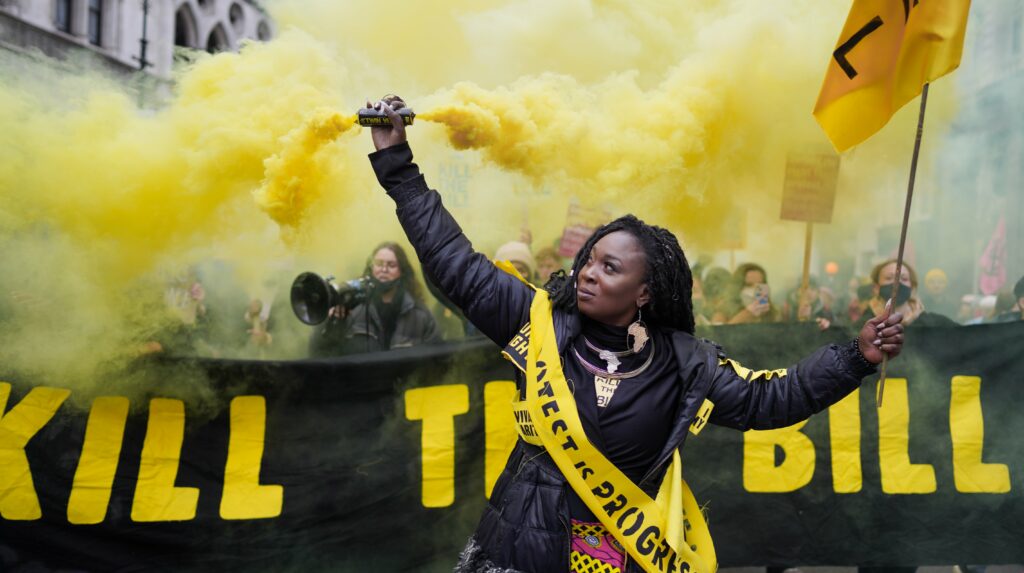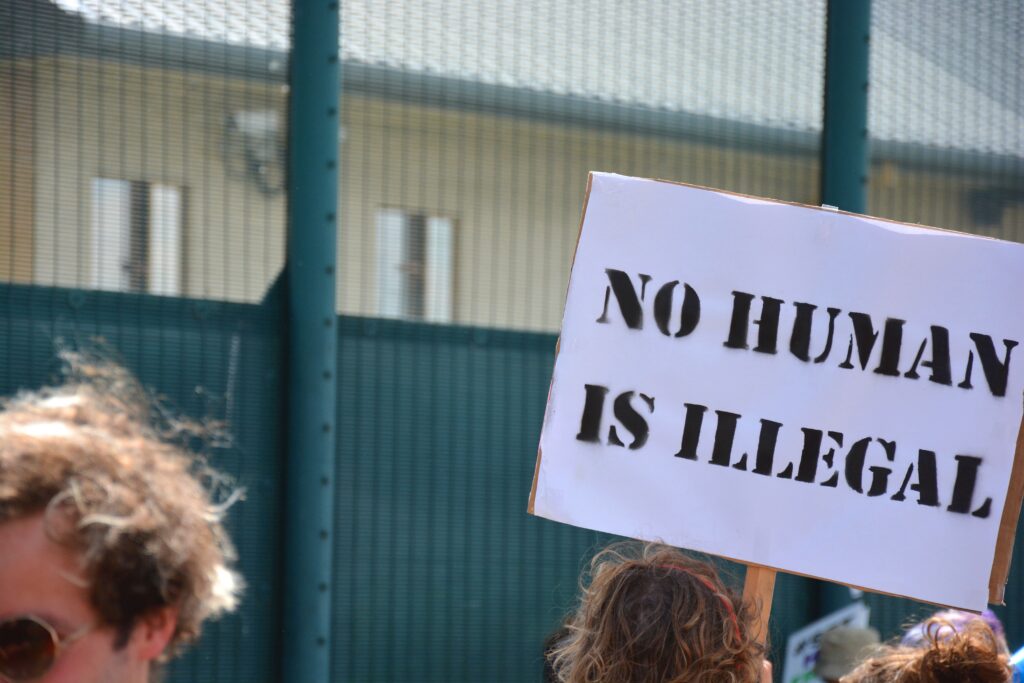
Simon Dawson / No 10 Downing Street
All the bad bills the Tories are pushing through this year
The anti-strike bill is just the latest in a series of moves that further infringe on our lives. Here are some of the dangerous bills the government is trying to pass in 2023.
Naomi Larsson Piñeda
17 Jan 2023
The new year started as the last ended – widespread industrial action and public sector strikes taking place week after week as essential workers continue to fight for their rights. And with more action planned from train drivers to the civil service, to nurses, ambulance workers and teachers, the Tories are working on new legislation that appears to be a direct attack on workers.
The Department for Business, Energy and Industrial Strategy has said a new bill will enforce a ‘basic’ level of service, meaning unions could be sued for not meeting these service levels.
This is just the latest in a series of legislative moves the government is aiming to push through this year that further infringe on our lives. By making it harder to strike, protest and vote, the insidious authoritarian elements of the Tory party are firmly taking hold. Here are the ones to look out for:
Strikes (Minimum Service Levels) Bill
What’s at risk?
The law would require a minimum level of service – ultimately decided by the government – when industrial action takes place and will impact transport, the NHS, fire and rescue, border security and nuclear decommissioning.
Employers would have to set a ‘work notice’ specifying the number of people required to work and what work is needed to meet the level set out by the government. Employees could be fired if they refuse. This would effectively void the rights of workers to withdraw their labour – a blatant attack on our democracy.
The head of the Trades Union Congress, Paul Nowak described it as “undemocratic, unworkable, and almost certainly illegal”.
The bill was announced in early January and on Monday 16 passed its second reading in parliament after MPs backed 309 votes to 249.
What can we do?
Sign Enough is Enough’s petition to oppose this legislation here, and follow news on demonstrations. Read more about why workers are striking, and show your support for those on the picket lines. Follow updates on a ‘protect the right to strike’ day set for 1 February, organised by the Trades Union Congress.
You can email and lobby MPs who’ll be closely scrutinising the bill at its committee stage, and of course, write to your own MP. See who has been speaking about the issue by going on the Hansard database of parliamentary debates.
Public Order Bill
What’s at risk?
The Public Order Bill seems to implicitly target climate protesters and direct actions. It establishes a new criminal offence for ‘locking on’ and obstructing key national infrastructure in England and Wales. It’s this part, clause 7, that rights organisations fear further attacks the right to strike, as it includes criminalising disturbances of transport systems like road and rail.
Our rights to protest have already been limited with last year’s Police, Crime, Sentencing and Courts Act that effectively controls the amount of noise or people taking part in demonstrations, among other restrictions. The Public Order Bill goes further, bringing in Serious Disruption Prevention Orders or ‘protest banning orders’ that would potentially ban named individuals from protesting or even using the internet in certain ways.
They plan to expand police stop and search powers to include searches on individuals or vehicles without suspicion. Stop and search already disproportionately targets people of colour, particularly Black communities, so this proposed bill will no doubt further entrench racism within the criminal justice system.
On the weekend it emerged the government would present a last minute amendment to the bill before it’s debated in the House of Lords later this month, which would give police powers to shut down protest before it begins. Number 10 said police “will not need to wait for disruption to take place and can shut protests down before chaos erupts”, meaning they’re attempting to clamp down on even more routes for the public to have their voices heard.
What can we do?
Follow Liberty, Greenpeace and Amnesty International’s campaigns and sign their petitions to remove anti-protest measures from the bill, and the work of campaign groups like Sister’s Uncut. Write to your MP and the peers who will be discussing it.

The Bill of Rights Bill
What’s at risk?
Dominic Raab has been intent on destroying the Human Rights Act through his rabid pet project, the Bill of Rights. This bill would effectively replace the act that protects our fundamental rights in the UK – for example, guarding us from intrusive surveillance to ensuring disabled people can access appropriate support.
One of the major dangers this new bill poses is the overhaul of the HRA’s ‘positive obligations’, which requires the state to take positive measures to safeguard our rights, while also refraining them from putting our rights at risk. Positive obligations have been used to seek justice by families of people who have died in state custody, for example. Raab’s bill lowers the level of protection given to human rights and significantly weakens the ability to hold the state accountable for human rights violations.
Alongside this, the bill seems to be steeply aligned with the government’s anti-immigration agenda. By restricting claims for the human right to family life, Raab is making deportations easier.
Raab, the justice secretary and deputy PM, first introduced the bill when he worked under Boris Johnson, only for it to be shelved when he was sacked by Liz Truss. As soon as he was brought back to the Cabinet by Sunak, the government has said the legislation will be revived, although there’s no confirmation on timings as yet.
What can we do?
Sign Liberty’s petition, find out more about the Human Rights Act here, and write to your MP.
Immigration plans
What’s at risk?
2022’s Nationality and Borders Act felt like the cornerstone of this government’s extreme hostility towards migrants and asylum seekers. Led by former home secretary hardliner Priti Patel, the act quite clearly seeks to punish those seeking refuge in the UK.
It brought new powers to remove asylum seekers and increase the standard of proof for establishing someone is a refugee. The Act also created a two-tier system for claims, meaning those who don’t arrive through ‘safe and legal routes’ are treated differently and will likely receive less support or protection. But the reality is, these ‘safe and legal routes’ are limited, and are further restricted by Home Office failings.
We’ve had a couple more prime ministers and home secretaries since the act was signed into law in April, but the cruel, discriminatory anti-immigration line pursued by this government remains strong and will likely appear in new legislation this year. Sunak said in December these policies would “make unambiguously clear that if you enter the UK illegally you should not be able to remain here. Instead, you will be detained and swiftly returned either to your home country or to a safe country where your claim for asylum will be considered.”
His new year statement cemented that a hardline stance on immigration remains a priority. The crackdown on ‘small boats’ even made it into Sunak’s top five priorities of this year, alongside halving inflation and cutting NHS waiting times. It feels dystopian – terrifying, even – that an idea that’s been condemned by human rights organisations and the United Nations for violating international law is being so steadfastly pursued and prioritised over the welfare of all of us.
The High Court ruled in December 2022 that the plan to forcibly send people seeking asylum in the UK to Rwanda was legal, so Sunak has pledged to restart these flights in the new year. However, just this week judges granted permission for that to be challenged at the Court of Appeal, meaning there’ll be no flights leaving soon.
The Rwanda Asylum Plan has been widely condemned for its inhumanity, and the first flight in June was cancelled within minutes before take-off after a ruling from the European Court of Human Rights.
What can we do?
Aside from writing to MPs, follow and support the work of groups such as Women for Refugee Women, Detention Action, SOAS Detainee Support, Stop Deportations and Praxis. The JCWI has a new campaign to support councillors to advocate for migrants’ rights. Read Liberty’s list of resources for immigration and asylum advice.

Retained EU Law (Revocation and Reform) Bill
What’s at risk?
The Retained EU Law (REUL) Bill intends to axe thousands of EU laws by the end of 2023. Since the UK officially left the EU at the end of 2020, no new EU laws made after that date have applied to us, yet most existing EU-derived laws were preserved and redefined in UK domestic law as ‘retained EU law’.
The government, led predominantly by avid Brexiteer Jacob Rees-Mogg, has been pursuing steps to shake off the EU’s legacy for months. Through REUL, all EU-derived legislation – from employment rights, to food standards, to environmental protections – will in theory be revoked by the end of this year. That is unless ministers specifically save them.
However, there are thousands of retained EU laws and there’s no certainty that all have been identified. Most worryingly, ministers have been given sweeping powers to pick and choose what stays or goes, with no requirement for expert advice or public consultation.
Unions have warned core workplace protections set by the EU, including holiday and maternity pay, and equal pay for men and women, are at risk. And as the majority of retained EU laws protect nature and environment, this could prove catastrophic for efforts to tackle the climate and biodiversity crisis. It could mean the loss of the Habitats Regulations which includes protections for nature against building developments, and affect the conservation of marine habitats. We could also see government requirements to reduce emissions and produce reports scrapped.
What can we do?
The bill is now due to have its report stage in the Commons where amendments can be made, so contact the MPs who will be debating it. This will be followed by a third reading on a date tbc. Follow Prime Minister’s Questions on Wednesday where they’re discussing the remaining stages of the bill. Check out Greener UK’s (a coalition of 10 environmental organisations) risk tracker for the policies that are most at risk.
Online Safety Bill
What’s at risk?
The Online Safety Bill is a clunky and controversial attempt to regulate content on the internet. While being deeply technical and incredibly long, over the year it’s made headlines with accusations that it harms free speech and encourages censorship, while also not going far enough.
Sex workers have said in its current form the bill may put their lives in danger. The document lists ‘causing or controlling prostitution for gain’ as an offence for tech companies to crack down on, which could mean legitimate online ads for sex workers are taken down. With these ads being removed, sex workers could be pushed into harmful, criminalised working conditions.
After a five-month delay, the bill returned to Parliament in December and is in the report stage of the Commons. If not passed by April 2023, it would be dropped entirely, and the process would need to be started from scratch.
What can we do?
A campaign by the English Collective of Prostitutes is encouraging people to write to their MPs calling for the removal of Clause 16 (Schedule 7 – Priority Offences) of the Online Safety Bill which would criminalise sex workers’ online advertising. See here for more information, and a template letter here.
The Elections Act 2022
What’s at risk?
The legislation was made into law last year, meaning May’s local elections will be the first time people in the UK have to take photo ID in order to vote (bar Northern Ireland where this is already a requirement).
It’s meant to tackle voter fraud even though this crime is in fact very rare – with just two convictions throughout 2019 and 2017’s elections. With as many as 3.5 million people without photo ID in this country, it threatens to stop people from exercising their democratic right to vote, with minority and working class communities disproportionately affected, including many trans and gender non-conforming people.
What can we do?
Follow a campaign by democracy organisations calling for an inquiry into the implementation of voter ID. And if you don’t have a photo ID listed here, you can apply for a free photo ID to vote.
Did we miss anything? Get in touch with us.
The contribution of our members is crucial. Their support enables us to be proudly independent, challenge the whitewashed media landscape and most importantly, platform the work of marginalised communities. To continue this mission, we need to grow gal-dem to 6,000 members – and we can only do this with your support.
As a member you will enjoy exclusive access to our gal-dem Discord channel and Culture Club, live chats with our editors, skill shares, discounts, events, newsletters and more! Support our community and become a member today from as little as £4.99 a month.









